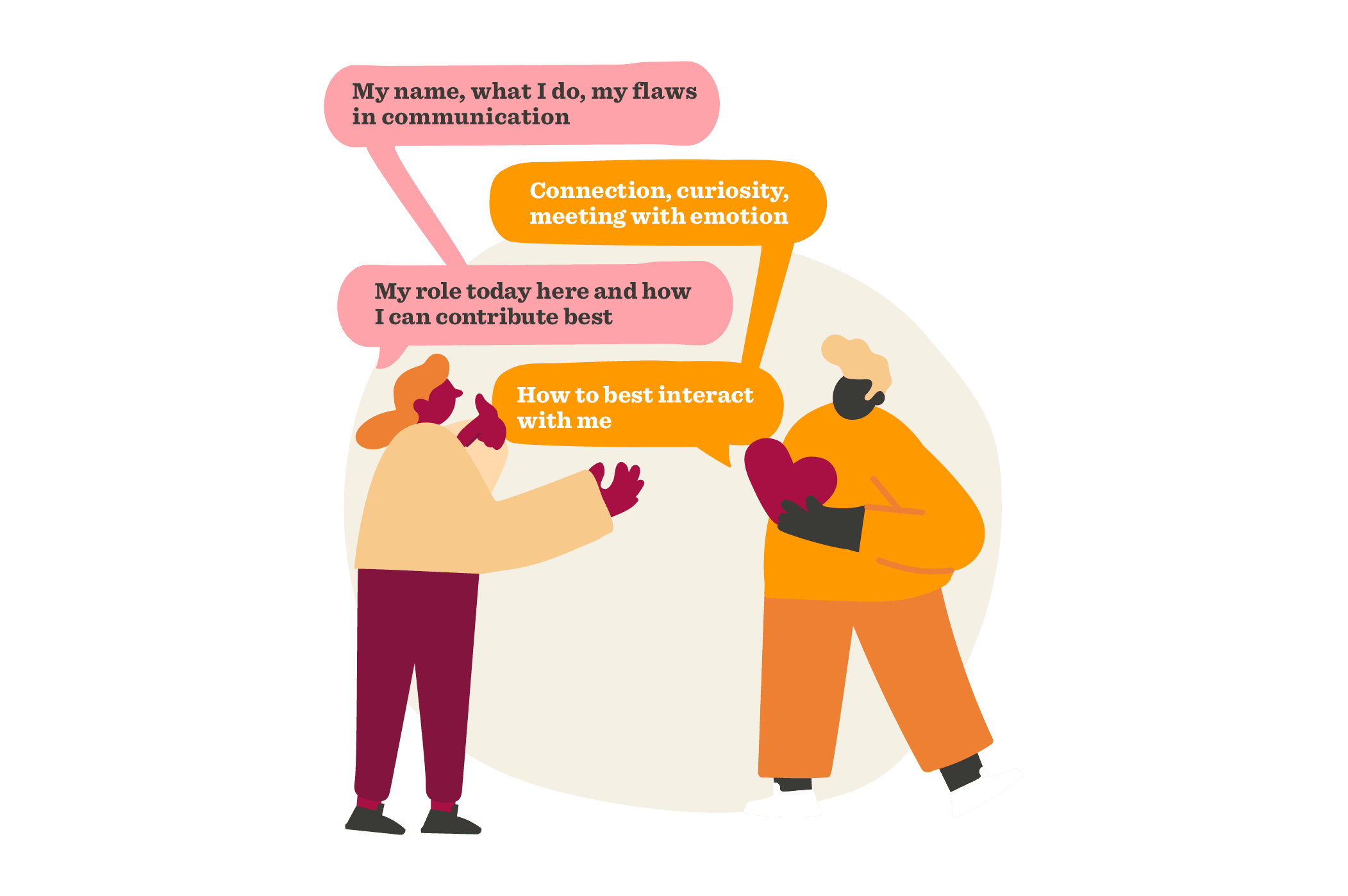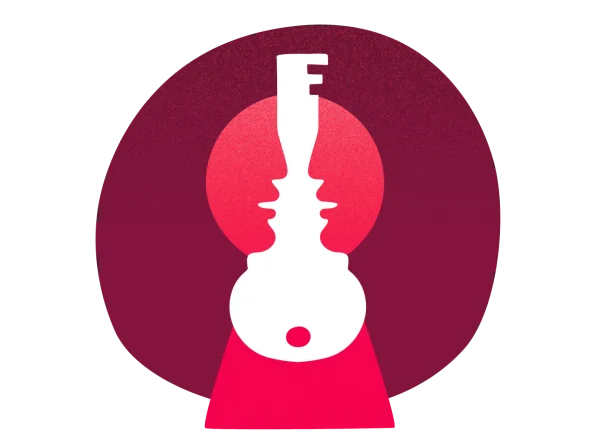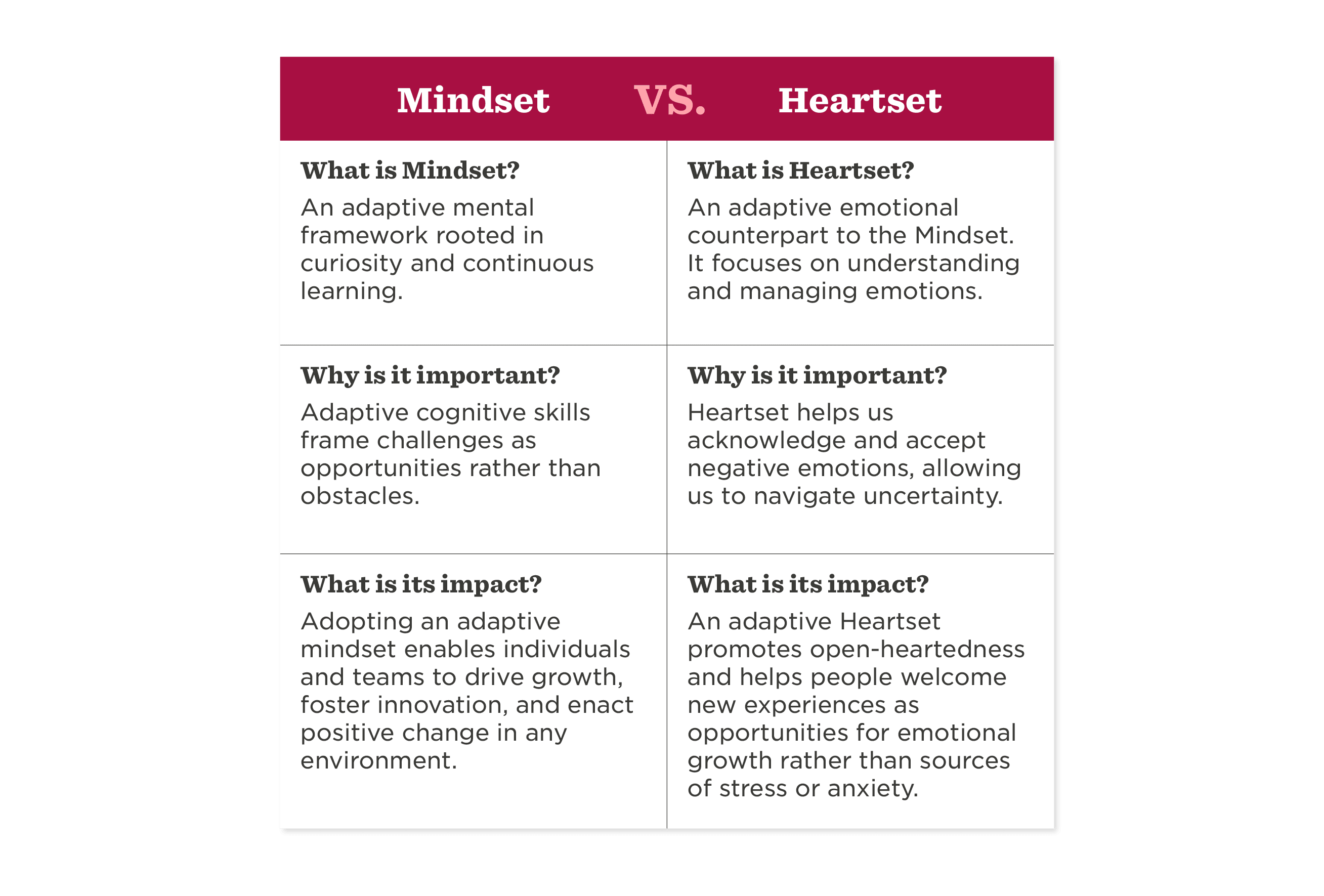Written by Lily Kriegs, Inclusive Culture and Belonging Partner at Spryker
Introduction
In the modern workplace, possessing technical skills and industry knowledge is undeniably important. Yet, there’s a growing recognition of the critical role played by the softer, more nuanced skills related to our emotional intelligence.
Traditional workplace cultures have long marginalized emotions and viewed them as irrelevant or detrimental to people’s professional success. However, the global experience of the COVID-19 pandemic profoundly shifted this perspective: It highlighted our shared vulnerability and humanity and reframed how we perceive our relationships with work.
Most importantly, the pandemic fundamentally changed how we engage with each other in our work environments and made speaking openly about our mental health and emotional wellbeing acceptable.

Champion emotionally intelligent workforces
Emotional agility and adaptability are essential to thriving in today’s work world. We in the HR profession stand at the crossroads of organizational culture and employee wellbeing as the champions of emotionally intelligent workforces. We are tasked with navigating and guiding our organizations through continuous change and advocating for people-first cultures that prioritize emotional maturity, inclusivity, and the wellbeing of our teams.
The journey towards these goals requires us to embrace and learn from our collective human experiences and foster environments where emotions are essential to who we are and the success of our organizations.
This guide explores emotional intelligence—our Heartset skill set—and frames it as a vital complement to the cognitive capabilities we often prioritize in our professional development, better known as Mindset (or hard) skills.
Heartset skills are the foundation of emotional intelligence—from self-awareness, self-management, and social awareness to building relationships. Every Heartset skill is crucial to mastering the art of people management. We’ll examine how we can apply each Heartset skill daily to enhance our roles as HR professionals and help us better support our organizations as we prepare for the future.
Jumpstart your emotional intelligence training program
This guide provides practical strategies and effective approaches to help support workplace cultures that prioritize work-life balance and emotional wellbeing as essential elements of professional success. We’ll use real-world examples to demonstrate the framework we’ve created for HR leaders to jumpstart a company-wide emotional intelligence training program.
Dive in to explore these strategies and approaches to learn how you can implement them in your workplace.
Heartset skills for HR managers
Heartset skills are emotional and social competencies that HR professionals like us can use to solve the challenges the present-day workplace presents us with. These challenges involve managing feelings, practicing empathy, and building relationships when interacting with others to more situational and technical challenges like navigating legal frameworks and compliance, managing budgets, etc.
The difference between Heartset skills and hard skills
Where hard skills are often considered the most important (because they typically concern technical expertise), Heartset skills are just as crucial. Each Heartset skill is critical to building exceptional leadership and thriving, collaborative teams that can healthily and successfully navigate the novel challenges that arise in the world around us.
Solid Heartset skills are key to knowledge-sharing and effectively communicating our expertise to our colleagues and customers. They enable us to build genuine connections and help us make a positive and professional impact.
Applying Heartset skills in the workplace
There are so many examples where you can apply irreplaceable Heartset skills in the workplace every day, especially when adjusting to huge changes, like new GDPR laws in Europe.
Recent GDPR updates required companies to make significant changes, including meticulously documenting, re-evaluating, or even eliminating old processes. The HR team stood at the front line throughout this transition, navigating a rough sea of resistance to change from people across the organization.
Even simple things like scheduling meetings with people to understand how these changes to GDPR would affect their teams’ workflows and force the shutdown of some projects proved to be a challenging exercise requiring high levels of emotional intelligence for many organizations.
Emotional intelligence (also known as the Emotional Quotient, or EQ) is fundamental to successfully managing transitions like this one: It’s critical for HR and people leaders to practice empathy and create safe, collaborative environments that encourage successfully finding solutions to both the technical challenges (like the updates to GDPR in our example) and people’s natural fear of and resistance to the unknown.
Raising awareness around the need to recognize and empathize with people who resist change is key. This enables organizations to create judgment-free workplaces and safe spaces to discuss complex topics (like change), adapt to workplace paradigm shifts, and adopt new strategies to handle them quickly—and forge a smooth path forward for all your people.
The 3 core Heartset skills and their impact
Conflicts often arise from behavioral misunderstandings, assumptions, and a lack of empathy, challenging us to address our emotions in the workplace. Traditional approaches that don’t acknowledge emotions might fail to tackle the heart of the matter—our basic human need for respect, understanding, and trust.
When laying the foundation of an emotional intelligence training program for your workplace, begin with these three core Heartset skills.
1. Emotional Openness and Vulnerability
Even though it might be scary, when embracing Emotional Openness and Vulnerability in HR practices, we recognize vulnerability as key to fostering trust, inclusivity, and cultures of meaningful feedback. When you train your team, it’s important to set an example.
Vulnerability allows us to connect deeply, making it safe for others to participate and engage in shared humanity in the workplace. Consider using these steps as a powerful starting point in your emotional intelligence training program:
1. Get to know each other
Give people the chance to learn who you are, who their peers are, and what everyone does in the company.
2. Set the stage for an open and productive conversation
Guide your people in conducting fruitful discussions with each other. Create a relaxing and safe environment where people can feel free to let their guard down and be themselves.
3. Lean into the “This is me, who are you?” model
This model can be transformative. As the leader of your emotional intelligence training workshop, telling people who you are and genuinely showing interest in who they are lays the groundwork for discussions based on mutual curiosity and understanding.
Some things I’ve shared with my team in emotional intelligence training workshops have been:
“I get nervous about meetings without agendas because surprises make me uncomfortable. How about you?”
I’ve also opened conversations with:
“I am not a native speaker. Please let me know if you find something I said odd during our conversation so we can clarify and understand each other better.”

This model, grounded in compassionate curiosity and active listening, has proven crucial in navigating conflicts and fostering a supportive workplace environment, underscoring the profound impact of Emotional Openness.
2. Self-Awareness
For HR managers and supporting leaders in our organization and feedback processes, Self-Awareness as a Heartset skill is critical.
Non-judgemental self-reflection in leadership and mindful decision-making are vital to building Self-Awareness. They might be difficult to practice at first, but they’re fundamental to helping us adapt to change and other challenges. The good news is that we can all train ourselves to improve these Heartset skills.
We can train ourselves to self-reflect by journaling. Writing things down gives us a sense of accountability and commitment to change. Non-judgemental self-reflection in leadership (and individual team members) enables us to open ourselves up to learning from our mistakes. It also allows us to view mistakes positively as part of our shared humanity.
To workshop self-reflective journaling, start with these steps:
1. Individual journaling exercise
Have people write down important observations and things they’ve learned from their daily interactions with others. Stress that journaling is more about the habit than the format.
2. Group journaling exercise
Personal journaling can be helpful to people, but in a work setting, group self-reflection can have a significantly positive impact on your leadership teams. Place people in groups of 2-3 and ask them to reflect on a project or activity they did together. Coach them to write about what worked well, what didn’t, what they can do differently in the future, and what boundaries they can set to nurture mutual respect—and become more empathetic and efficient when working together.
3. Identify learning points
Work with each group in the workshop to identify learning points. This helps make goals actionable, trackable, and measurable so we have ways to review and celebrate our progress.
Self-Awareness as a Heartset skill lays the groundwork for people to fully understand how we react to what happens around us. It also helps us pause and think before we act. When we’re mindful of our emotions, we’re better able to understand how we react to something (and why)—and when we need more time for further deliberation.
Being mindful can be challenging, but achieving it is rewarding, especially when it helps navigate difficult conversations with team members and peers. It’s also beneficial to intercultural communication, which is absolutely critical in today’s multi-cultural and global world of work.
3. Risk-taking
Risk-taking is not a Heartset skill that comes naturally or comfortably to us. As humans, one of our primary emotional needs is to feel safe. However, when used intentionally, embracing controlled risks can lead to growth and innovation.
It takes a lot of courage for each of us to make decisions. Our fear of taking risks and failing overshadows our need to feel safe. Shifting our mindset just a little can thaw our fears and give us the courage to take deliberate action and ownership of the outcome with intelligent understanding.
To set up your emotional intelligence training workshop on Risk-taking, start with these steps:
1. Envision and prepare for future scenarios
This exercise builds people’s strategic thinking and scenario planning skills to mitigate their fear of taking risks.
Have participants imagine various potential situations and create strategies to address them. This helps prepare your leaders and their teams for unforeseen events, improves decision-making, and increases adaptability.
2. Use mindmaps to visualize outcomes
Place people in groups for this exercise to give them the advantage of working with diverse perspectives and ideas.
Have your participants build mindmaps to visualize outcomes to the scenarios they imagined in Step 1, and urge them to consider short and long-term strategies when reflecting on the most plausible scenarios.
3. Turn failures into invaluable lessons
Talk about the positive gains of viewing every decision and risk as a learning opportunity.
A slight shift in perspective enables people to take ownership of their emotional state while making a decision. This shift allows people to transform their view of risk from a potential failure to an invaluable lesson that can help them exceed their original goals.
Of course, we can always make up excuses to avoid answering new questions in a survey, voicing our opinions about how to take action, or proposing a new creative solution. Fearing feedback is natural, but developing the Risk-taking Heartset skill allows us to leave our comfort zone and gain experience.
Taking risks gives us the opportunity to learn more, achieve more, and prove ourselves.

Heartset skills help us learn from the past to respond to an unpredictable future
Mastering Heartset skills and emotional intelligence are core tenets of effective leadership. They’re critical to supporting teams and encouraging engagement. They also help us inspire empathy and serve as better role models in our organizations every day.
HR professionals and leaders are essential to achieving people-centric cultures, bridging communication gaps, and creating meaningful relationships between people across every organization.
We can learn a lot from our past to better respond to a wholly unpredictable future. But as humans, we don’t like unpredictability for the same reason we don’t like change: It makes us feel unsafe.
But the world changes whether we like it or not. Take the last two decades:
- The financial crisis in 2008
- The global pandemic of 2020
- The economic volatility and threat of a global recession in 2023
We need adaptability to survive, especially in our professional lives. It’s the most effective skill we can develop to help us navigate our ever-changing world of work. Adaptability allows us to anticipate change, prepare for it, and (most importantly) respond proactively by building the emotional and practical resilience we need to master the challenges the world presents to us.
The goal is not to predict the future but to mitigate the surprise and be confident about our options and how to move forward. Confidence—combined with resilience—reduces anxiety around daily tasks and boosts composure.
Heartset skills keep us agile and adaptable. They help us make decisions that align with long-term goals in a fast-changing environment while remaining flexible and innovative.

Build leadership skills through Heartset skills
Empathy is the ability to understand and share the feelings of others. But, in this complex world (and especially in the world of work), empathy is not enough.
We need empathetic accuracy and compassionate curiosity. When people understand and feel for each other, they’re better able to collaborate, learn from one another, and overcome challenges.
Positive outcomes in the workplace (and in life) rely on people consciously striving to understand others and build relationships with our colleagues that strengthen our communication capabilities to more constructively resolve conflicts.
It is vital to normalize asking questions regularly and out loud to achieve positive outcomes.
Ask yourself: Do I correctly understand what the other person is trying to tell me?
Encourage every leader and individual contributor to make asking themselves this question a regular practice.
Build collective resilience
Building collective resilience is one of the most rewarding tasks for HR leaders who care about growing and nurturing healthy organizational cultures. Building collective resilience requires training people’s ability to activate their happy memories, being conscious of their achievements and superpowers, and having the capacity to bounce back from adversity when things get tough.
Mastering collective resilience as a Heartset skill allows people to adapt to change without self-judgment or negative self-talk. It’s crucial in the workplace, where we face numerous challenges that require us to stay calm, professional, and focused.
Teach the art of collective resilience
As HR professionals and people leaders, our role often depends on the decisions of others and external changes (like market trends and shifts in generational expectations). We have the privilege and responsibility to teach our teams the art of collective resilience.
Developing collective resilience gives us the power to adapt quickly and proficiently to waves of constant change. Resilience requires emotional memory and maturity to know that everything is temporary. It’s having the confidence to know how to accept that some things are out of our control—but people’s power lies in focusing on the things we can proactively impact.
It’s important to acknowledge that resilience isn’t about enduring more and more to the point of burnout. Rather, it’s about understanding how to accept the challenges on your plate right now. It’s about having the emotional memory that we overcame difficult situations before and having the ability to prioritize for impact.
Positively process underachievements
Create a space for processing events or tasks that didn’t go so well. This is an opportunity to conduct a collective learning experience where everyone can discuss the reasoning behind decisions that didn’t work out—and understand what didn’t work and why. This is also a great way to help your teams distance themselves from negative emotions around failure and the guilt or shame failure may bring.
Use times like these to demonstrate how failure is an opportunity to learn, celebrate curiosity, and build a new and more robust strategy.
Have your people write about their experiences so they can go back and look at them in retrospect. Think about celebrating achievements to create visibility and memories of remarkable accomplishments. This also allows people to go back and see that they’re doing a great job, even when self-doubt starts eating at their self-confidence.
Focus on driving purposeful impact
Passion for what we stand for as HR leaders drives our motivation and fuels our collective hearts as we strive to reach the same goals. Passion is contagious: It powers change-makers who act purposefully and it positively impacts everyone in the workplace.
The next time you develop a new process or create an advocacy program (or give someone else in the organization guidance), bring your passion to the table and let it drive your impact.
For example, ask:
- How do your organizational goals connect with human experiences?
- How can improving the employee experience help meet and exceed your goals?
- How can your DEI&B programs promote more engagement if you frame them in a way that shows everyone we’re rooting for the same things: healthy workplace cultures, more happy customers, higher success rates, intercultural competency, international collaboration, and expanding market expertise?
You can teach, develop, and apply the three Heartset skills we’ve discussed in your organization to achieve a healthier workforce and exceptional workplace culture.
This is the magic role of HR departments—we serve as the heart of the organization’s collective resilience and lend this power to those who may feel overwhelmed by change or who may not have a lot of experience with change. Most of all, we provide organizations and their people with a human approach to moving forward. Emotional intelligence is transferable like that. Heartset skills can be taught.
7 ways to integrate Heartset skills into HR practices
Now that we know exactly what Heartset skills are and their criticality to forging open, healthy, and successful work cultures alongside their hard-skill (Mindset) counterparts, it’s time to talk about how to apply them practically in your workplace every day.
1. Normalize emotional intelligence in all roles
HR professionals are in the perfect position to normalize the acknowledgment of emotion in the workplace.
Talking about how we feel and how ideas, words, and actions impact us is key to any effective communication strategy. With HR leading the charge to normalize emotional intelligence, organizations today can take the first steps to create more agile workforces that excel at adapting to change.
2. Empower the balance between authenticity and self-awareness
Mastering Heartset skills and emotional intelligence helps us set boundaries and express our opinions in emotionally mature and respectful ways.
As HR leaders, it’s our responsibility to create work environments where people can be their authentic selves, feel seen and understood, and have their basic emotional needs met. Imparting these critical skills to all team members at our organization requires robust and thoughtful emotional intelligence and Heartset skills training.
Role-modeling self-awareness and emotional openness for our organizations shows people through example how they can work better together when they practice empathy and compassionate curiosity about the needs of others.
3. Be a role model
People across the organization look up to HR professionals as role models, so it’s essential to lead by example. This is why expressing gratitude and emotions clearly when giving or asking for feedback is crucial.
It’s important to ask questions that help you understand the situation and read the room correctly. This encourages open communication and makes people comfortable expressing themselves. The more we refine our empathic accuracy, the more we can mitigate misunderstanding and miscommunication, leading to more positive and sustainable outcomes.
4. Support and train leaders
Supporting and training organizational leaders is one of HR professionals’ most impactful roles. Training leaders to understand and optimize their Heartset skills will also make a huge difference in your retention efforts.
For example, people often tell HR professionals that they want to feel understood. It might seem simple, but it’s only simple with empathetic leaders driving the way forward.
Provide leaders with guidance on managing their emotions and the emotions of others during meetings and feedback sessions to help your teams conduct more constructive conversations. These types of conversations can positively impact performance and increase people’s sense of belonging throughout your organization—ultimately improving collaboration and success.
5. Develop safe spaces
Give people a space to share their voices freely and without judgment—and motivate each other to take the next steps toward mutual success.
Safe spaces encourage people to discuss projects, changes, collaborations, and what they’ve learned. It will encourage people to acknowledge what went well, what can be improved, and to find common goals with their peers.
6. Encourage a feedback culture
Nearly every successful guide to building a healthy workplace emphasizes the importance of encouraging a feedback culture. Companies with exceptional cultures understand feedback’s powerful and positive impact and embed it in their daily workflows.
Feedback cultures are also incredibly beneficial for retaining top talent. But for feedback cultures to have the impact we intend them to have, it’s critical for people to accept feedback and adopt it into their everyday workflows. Maintaining positivity, clarity, and empathic accuracy throughout the process is vital.

7. Reflect on your Heartskill journey
Reflective journaling can be a powerful tool for us as individuals to reflect on our Heartskill journey. We cultivate emotional openness best when we articulate our emotions and learn to differentiate their nuances.
Use reflective journaling with your people to help your teams differentiate anger from indignation and disappointment. This is key to helping us identify and define our feelings—and asking ourselves the right questions about how to handle them maturely, especially in the workplace.
For example, understanding the difference between anger, indignation, frustration, or disappointment can give your team a better idea of how to act upon each emotion in stressful situations at work—and how to act responsibly. Knowing how to handle our emotions is key to solving and resolving sensitive situations effectively.
Heartset skills: Redefining the essence of HR management
As we close this exploration of Heartset skills, it’s clear that emotional and social competencies aren’t just nice-to-haves: They’re crucial skills in the evolution of HR management. The journey to improving emotional intelligence can motivate us to explore how deep understanding, empathy, and emotional agility can dramatically enhance our professional interactions and workplace cultures.
Heartset skills allow us to navigate the intricacies of human emotion and turn challenges into opportunities for connection and growth. From the transformative “This is me. Who are you?” approach to fostering resilience and risk-taking for innovation, each skill can support a cohesive strategy for fostering environments where humans with different experiences can thrive.
Heartset skills complement our technical expertise, enrich our human interactions, and ensure that we adapt and build resilience, making our workplaces not just spaces for work but communities for growth, learning, and mutual support.
The journey we take to embed Heartset skills into our collective experience and our passion for meaningful human interaction can teach us a lot about leading change through cultivating emotionally intelligent workplace cultures.
Embrace these insights, share your stories with your colleagues across your organization and professional network, and together redefine the essence of HR management—making it more human, more compassionate, and more inclusive today and for the future.
Recommended For Further Reading
About the author
With over two decades in the tech industry, Lily Kriegs has always prioritized the human element. As an HR/DEI&B leader and an Inclusive Culture and Belonging Partner at Spryker, she’s dedicated herself to building emotionally intelligent work environments centered around wellbeing and respect where everyone feels genuinely included and supported.
Lily’s approach to life and work is deeply rooted in kindness—a principle she believes is pivotal in every aspect of life—offering a universal language that transcends professional boundaries. It’s a reminder that, amidst our roles and responsibilities, being kind is a choice we can make every day, everywhere, to foster a more inclusive and empathetic world.
Her experiences as a mother and immigrant from Mexico who’s lived in Germany for 30 years have also enriched her personal and professional journeys. Continuous learning has brought her to coaching, mental health first aid and continuous support, and burnout prevention—with a foundation in evidence-based practices that foster resilience and work-life harmony.
When she’s not working, Lily loves to read, hike, and practice QiGong. She is a passionate literature enthusiast who finds joy in writing poetry and mentoring young leaders.
About Spryker
Spryker is the leading composable commerce platform for enterprises with sophisticated business models to enable growth, innovation, and differentiation.
Designed specifically for sophisticated transactional business, Spryker’s easy-to-use, headless, API-first model offers a best-of-breed approach that provides businesses the flexibility to adapt, scale, and quickly go to market while facilitating faster time-to-value throughout their digital transformation journey.
As a global platform leader for B2B and B2C Enterprise Marketplaces, Thing Commerce, and Unified Commerce, Spryker has empowered 150+ global enterprise customers worldwide and is trusted by brands such as ALDI, Siemens, Hilti, and Ricoh. Spryker was recognized by Gartner® as a Visionary in the 2023 Magic Quadrant™ for Digital Commerce and was also ranked as a Strong Performer in The Forrester Wave™: B2B Commerce Solutions, Q2 2022. Spryker is a privately held technology company headquartered in Berlin and New York.

